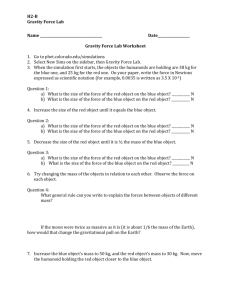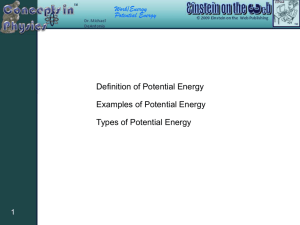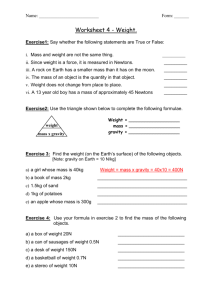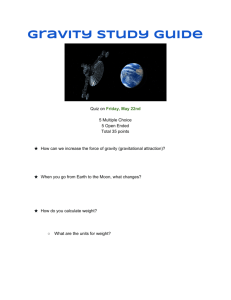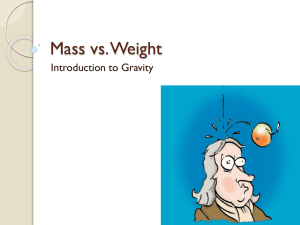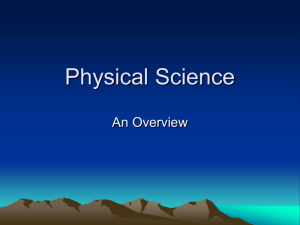Weight = mass x gravity factor
advertisement
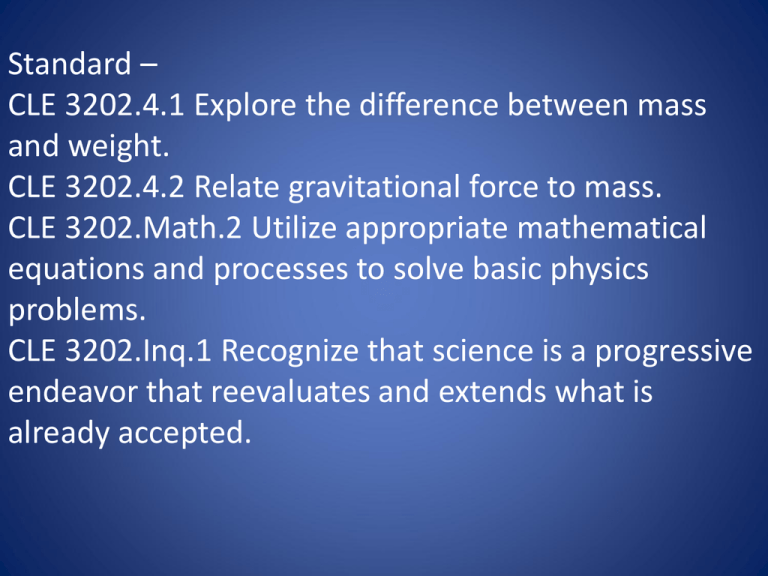
Standard – CLE 3202.4.1 Explore the difference between mass and weight. CLE 3202.4.2 Relate gravitational force to mass. CLE 3202.Math.2 Utilize appropriate mathematical equations and processes to solve basic physics problems. CLE 3202.Inq.1 Recognize that science is a progressive endeavor that reevaluates and extends what is already accepted. Objective: Today you will…. 1.Describe gravity. 2.Explain the relationship between weight and mass. 3.Compare and contrast planet characteristics to derive what variables influence a planet's gravitational strength. 4.Discover how much you weigh on various planets 5.Investigate your hypothesis by calculating your weight on each planet. Prove or disprove your hypothesis about the causes of a planet's gravitational strength 6.write a paragraph that explains what characteristics cause a planet to have more or less gravity 7.Predict what you would weigh on newly discovered planets. Bell ringer: 1. On Earth how could you judge up from down? 2. Predict the weight if a scale floated by an astronaut in space and he stood on it. Earth is exerting a noticeable force on these people. Do astronauts actually lose weight while in space? Gravity is a Basic Force in the universe. It affects all objects in the universe. So… what is gravity? Why does the cereal and milk fall downward? Gravity is an attractive force between two objects. The law of gravitation states that any two objects exert an attractive force on each other. Gravity is related to two things: 1. mass of the objects 2. the distance between the objects How do these 2 things affect the amount of gravity? Let’s look at 2 animations to answer this question. Explain what is happening in this animation? The larger an object is, the more gravity it creates. What is going on in this animation? http://www.splung.com/content/sid/2/page/g ravitation The attractive force of gravity increases if the distance between the objects decreases. To Sum It All Up ! The attractive force of gravity increases if the mass of the objects increase. We often use the words “mass and weight” interchangeably. But there is a difference between the two words. Mass is the amount of matter within an object. Weight is a measurement of gravitational force upon the mass of the object. Scales measure the force of attraction between you and the Earth. The more mass you have, the more gravitational force on you and the more you weigh. We can also use a scale to measure the force of gravity on us at various distances from the Earth’s core. For example, your weight would be 0.2% less on the top of Mt. Everest. Why do you weigh less? Predict what happens to your mass? Theorize how much your weight changes as you move across our solar system? What does this weight change depend upon? Location Earth Gravity Factor 1 What would be the formula to calculate your weight? Earth's moon 0.17 Venus 0.90 Let’s do one together. Mars 0.38 Now you help me one. Mercury 0.38 Jupiter 2.36 Saturn 0.92 Uranus 0.89 Neptune 1.13 Pluto .007 You do the other calculations. Weight = mass x gravity factor Let’s check your work To find your weight on different planets http://www.exploratorium.edu/ronh/weight/ Go to the section “Analyze your data” Where do you weigh the most? I weigh the most on Jupiter. I weigh 401 pounds on Jupiter. I weigh the least on Pluto with a weight of 1.19 pounds. Is weight a force? We can rewrite this formula as F=mxg This formula will lead into Newton’s second law of motion, which we will discuss later. Write a brief paragraph that explains in detail. •Which properties cause a planet to have more or less gravity? Why? •Which properties do not impact gravity? Why? •How does gravity affect objects on the planet? Use what you have learned to predict how much would you weigh on some far away stars? Andromeda with gravity factor of 1.725 Ursa Major with gravity factor of 6.063
